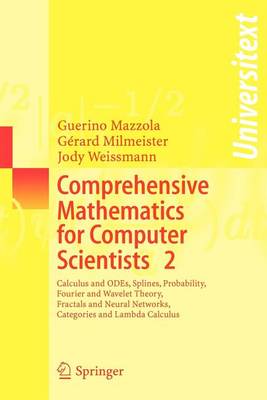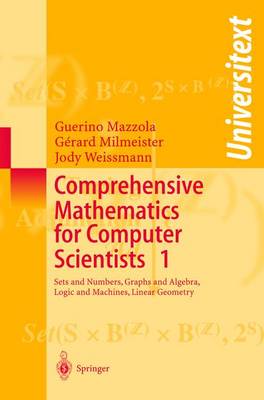Universitext
2 total works
Comprehensive Mathematics for Computer Scientists 2
by Guerino B Mazzola, G Rard Milmeister, and Jody Weissmann
Published 21 October 2004
This second volume of a comprehensive tour through mathematical core subjects for computer scientists completes the ?rst volume in two - gards: Part III ?rst adds topology, di?erential, and integral calculus to the t- ics of sets, graphs, algebra, formal logic, machines, and linear geometry, of volume 1. With this spectrum of fundamentals in mathematical e- cation, young professionals should be able to successfully attack more involved subjects, which may be relevant to the computational sciences. In a second regard, the end of part III and part IV add a selection of more advanced topics. In view of the overwhelming variety of mathematical approaches in the computational sciences, any selection, even the most empirical, requires a methodological justi?cation. Our primary criterion has been the search for harmonization and optimization of thematic - versity and logical coherence. This is why we have, for instance, bundled such seemingly distant subjects as recursive constructions, ordinary d- ferential equations, and fractals under the unifying perspective of c- traction theory.
Comprehensive Mathematics for Computer Scientists
by Guerino Mazzola, Gerard Milmeister, and Jody Weissmann
Published 6 April 2004
This two-volume textbook Comprehensive Mathematics for Computer Scientists is a self-contained comprehensive presentation of mathematics including sets, numbers, graphs, algebra, logic, grammars, machines, linear geometry, calculus, ODEs, and special themes such as neural networks, Fourier theory, wavelets, numerical issues, statistics, categories, and manifolds. The concept framework is streamlined but defining and proving virtually everything. The style implicitly follows the spirit of recent topos-oriented theoretical computer science. Despite the theoretical soundness, the material stresses a large number of core computer science subjects, such as, for example, a discussion of floating point arithmetic, Backus-Naur normal forms, L-systems, Chomsky hierarchies, algorithms for data encoding, e. g. , the Reed-Solomon code. The numerous course examples are motivated by computer science and bear a generic scientific meaning. This text is complemented by an online university course which covers the same theoretical content, however, in a totally different presentation.
The student or working scientist who once gets involved in this text may at any time consult the online interface which comprises applets and other interactive tools.
The student or working scientist who once gets involved in this text may at any time consult the online interface which comprises applets and other interactive tools.

